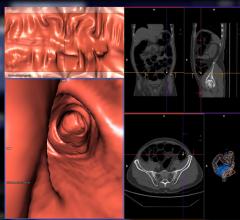
January 14, 2009 – A published report of a meta-analysis by Thad Wilkins, M.D., et al. in the January/February issue of Annals of Family Medicine on colonoscopy screening for colorectal cancer performed by primary care physicians raises several important issues regarding the quality of the exam, the safety of patients and the effectiveness of detecting colorectal cancer and pre-cancerous changes in the colon, said the American College of Gastroenterology, but noted the study might be misleading.
"The clinical evidence supports the College's position that the training and experience of the endoscopist are critical to a quality colonoscopy and cancer detection," said Eamonn M.M. Quigley, M.D., FACG, president of the American College of Gastroenterology. "The College advises patients to seek a well-trained endoscopist who performs many of these tests and has a record of performing a complete examination of the colon. A patient undergoing a colonoscopy must be assured that their examination will truly be capable of detecting any and all abnormalities that could indicate disease or a predisposition to cancer. Otherwise, colon cancer will not be prevented."
"Any physician who performs colonoscopy needs to meet a high standard, and must be capable of interpreting all possible abnormalities seen, dealing with any therapeutic interventions that may arise, and managing the patient's safety," added Dr. Quigley.
The College believes that the findings of the Wilkins study are potentially misleading.
"This study is a meta-analysis of reports from selected centers reporting detection rates of adenomas and cancers in screening colonoscopies by primary care physicians. These data from selected centers are less generalizable than data obtained from population-based studies on detection rates of neoplasia," said Douglas K. Rex, M.D., FACG, a representative of the ACG to the U.S. Multi-Society Task Force on Colorectal Cancer.
Available evidence directly comparing primary care physicians to gastroenterologists for the most important endpoint in colonoscopy, i.e. detection of cancer, indicates that gastroenterologist performance on average is clearly superior to primary care physicians'. According to Dr. Rex, all three population-based studies that have determined miss rates for colorectal cancer during colonoscopy by specialty have found that primary care physicians are more likely than gastroenterologists to miss colorectal cancer during colonoscopy (Rex et al Gastroenterology; 1997: 112:17-23; Bressler et al Gastroenterology 2007; 132:96-102; Singh et al Gastroenterology 2007; 132:A-149).
Dr. Rex said the Wilkins study is seriously flawed with regard to the detection rate, since 13,363 (73 percent) of 18,292 colonoscopies are derived from a single study, which was not reported in a peer reviewed journal. According to Dr. Rex, the colonoscopies from the study should have been excluded because the center employs a gastroenterologist and colorectal surgeon, one of whom is on site full-time to rescue procedures when primary care physicians fail to reach the cecum. Moreover, this center has claimed that primary care physicians have equal success rates in their initial procedures compared to those performed after they are fully trained. This could only be achieved with assistance from the specialist. Since this situation is seldom if ever seen elsewhere in clinical practice, the procedures in this report should have been excluded from the study by Wilkins et al., according to Dr. Rex.
For more information: www.acg.gi.org


 February 06, 2024
February 06, 2024 








